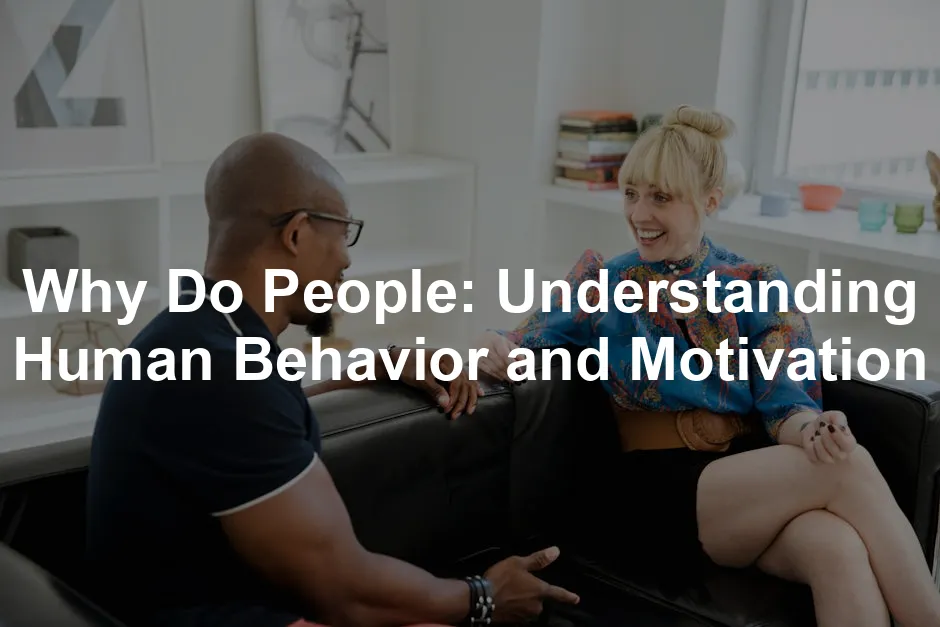
Why Do People: Understanding Human Behavior and Motivation
Consider how these traits manifest in everyday scenarios. Two people might face the same work deadline. An extrovert may rally a team, fostering collaboration. Meanwhile, an introvert might prefer to tackle the task independently, focusing deeply on the details. Both approaches can be effective, but they stem from different personality traits.
Studies support the link between personality and life outcomes. Research published in the Journal of Personality and Social Psychology found that certain traits correlate with job performance. Individuals high in agreeableness often excel in teamwork, enhancing group dynamics. Conversely, those with high openness may thrive in creative fields, bringing fresh ideas to the table.
Understanding your personality can be a game-changer. It not only helps you navigate your relationships but also guides your career choices. Want to learn more about your personality? Consider taking a personality test! It can provide valuable insights into your unique traits and how they influence your actions.
By recognizing these individual differences, we can foster a greater appreciation for the diverse ways we all navigate the world. Personality shapes our behavior in countless ways, influencing how we interact with others and approach our goals. So, what’s your personality type? And to help you along your journey, how about a little self-help? Check out Self-Help Books for Personal Development for more insights!

The Role of Emotions in Decision-Making
How Emotions Drive Actions
Ever noticed how emotions influence your choices? Emotions play a significant role in our daily decisions. They often push us toward specific actions, sometimes without us even realizing it. Understanding this connection can be a game changer for personal and professional growth.
Emotional intelligence is the key here. It’s the ability to recognize and manage our emotions and the emotions of others. Research shows that people with high emotional intelligence make better decisions. They can navigate challenges effectively and maintain healthy relationships. In fact, a study from TalentSmart found that emotional intelligence is responsible for 58% of job performance. That’s not just impressive; it’s essential!
Think about emotional triggers in your life. Have you ever made a snap decision based on anger or joy? These emotional responses can sway your choices significantly. For example, someone might buy an expensive item when excited, later regretting it. Recognizing these triggers helps us make more conscious decisions. To help you manage those emotions, check out Emotional Intelligence: Why It Can Matter More Than IQ. It’s a must-read!
So, how can you manage your emotions to improve decision-making? Here are a few techniques:
- Pause and Reflect: When faced with a decision, take a moment to breathe. This helps you assess your emotional state before acting.
- Practice Mindfulness: Engage in mindfulness exercises. They can help you become more aware of your emotions and how they influence your thoughts.
- Seek Feedback: Discuss your feelings with trusted friends or colleagues. Their perspectives can provide clarity and help you see things from different angles.
Real-life examples abound. Consider a leader who remains calm during a crisis. They can think clearly and guide their team effectively. Conversely, a manager overwhelmed with stress may make hasty decisions that harm the organization.
Statistics further emphasize the importance of emotional intelligence. A study published in Psychological Bulletin found that emotionally intelligent individuals are better at conflict resolution and adapt more easily to change. This adaptability leads to more successful outcomes, both personally and professionally.
Want to improve your emotional intelligence? Start practicing mindfulness or emotional regulation techniques today. These skills can pave the way for better decision-making and healthier relationships. You might want to check out Mindfulness for Beginners for some great starting techniques!
Understanding the role of emotions in decision-making is crucial. By managing our feelings, we can enhance our choices and foster stronger connections with those around us.

Coping strategies are essential for effectively managing anxiety in daily life and can greatly improve your overall well-being. why are coping strategies essential for handling anxiety in daily life
Conclusion
In this exploration of human behavior, we highlighted the vital role of emotions in decision-making. Emotions significantly impact our choices and can lead us to act impulsively or thoughtfully. By recognizing and managing our emotional responses, we can enhance our decision-making skills.
Understanding the “why” behind actions fosters empathy and improves interpersonal relationships. I encourage you to apply these insights in your daily life. Reflect on your emotions and how they influence your interactions with others. Small changes can lead to profound improvements in your relationships and overall well-being. And if you’re looking for ways to enhance your relationships, consider The Five Love Languages, it might just transform how you connect with others!
FAQs
Why do people behave differently in social situations?
People often adjust their behavior based on social dynamics. Think about a party: some are outgoing, while others are reserved. This variation can stem from individual differences, such as personality traits and social anxiety. Environmental factors also play a role. In familiar settings, people tend to feel more at ease. In contrast, new or intimidating environments can trigger self-consciousness. Social situations are complex, and understanding these behavior differences can enhance our interactions with others.
How does mental health influence behavior?
Mental health significantly affects how we act daily. Conditions like anxiety or depression can lead to withdrawal or irritability. For instance, someone facing depression may isolate themselves, avoiding social interactions. Conversely, anxiety can cause people to overreact or act defensively in certain scenarios. Recognizing these connections is vital for fostering empathy and support within our communities. By understanding this influence, we can create more inclusive environments that accommodate mental health challenges.
What are the main psychological needs that drive human behavior?
Several key psychological needs drive our actions. These include the need for belonging, esteem, and self-actualization. Belonging refers to our desire for connection and acceptance within a group. Esteem relates to feeling valued and recognized. Lastly, self-actualization is about reaching our full potential. When these needs are unmet, individuals may engage in unhealthy behaviors to compensate. By identifying and addressing these psychological needs, we can enhance our motivation and overall well-being.
How can understanding personality types improve relationships?
Understanding personality types can greatly enhance our relationships. Each person has unique traits that influence their actions and reactions. For example, extroverts thrive on social interactions, while introverts prefer quieter environments. Knowing these differences helps us navigate conflicts and communicate more effectively. Embracing diverse personality types fosters empathy and appreciation for varying perspectives. By considering personality dynamics, we can build stronger connections and create healthier relationships in all aspects of life.
What are some effective strategies for managing emotions?
Managing emotions is crucial for maintaining mental well-being. One effective strategy is practicing mindfulness. This technique encourages awareness of your feelings without judgment. Another approach is deep breathing exercises, which can help calm your mind in stressful situations. Journaling is also beneficial; it allows you to express and process emotions. Lastly, seeking support from friends or professionals can provide valuable insights and guidance. Implementing these emotional management strategies can lead to healthier coping mechanisms and improved relationships.
Please let us know what you think about our content by leaving a comment down below!
Thank you for reading till here 🙂
All images from Pexels
Introduction
Have you ever wondered why people act the way they do? Understanding human behavior is essential for fostering better relationships and improving societal dynamics. By exploring the motivations behind actions, we can create stronger connections with others. Various factors shape our behavior, including psychological needs, social environments, and personal experiences. Let’s dive deeper into this topic!
To kick off our journey into human behavior, consider grabbing a copy of Maslow’s Hierarchy of Needs: A Theory of Human Motivation. This book will not only enlighten you about the five levels of needs but also provide a roadmap for personal growth and motivation!
Summary and Overview
In this article, we will explore the fascinating world of human behavior. We will discuss the significance of understanding motivations, which can lead to personal growth, improved mental health, and healthier interpersonal relationships. Psychological theories, such as Maslow’s Hierarchy of Needs, will help us understand the driving forces behind our actions. Additionally, we will examine how social influences shape behavior and the interconnectedness of various motivations. By grasping these concepts, we can develop empathy and create better outcomes in our communities. Understanding the “why” behind actions is not just insightful; it’s transformative for ourselves and society as a whole.
If you’re curious about emotional intelligence, I recommend Emotional Intelligence 2.0. This book will help you understand the nuances of emotional intelligence and how it can dramatically improve both your personal and professional life!
The Psychological Foundations of Behavior
Understanding Psychological Needs
Have you ever wondered what drives your actions? Understanding psychological needs can shed light on this question. Maslow’s Hierarchy of Needs is a great starting point. This theory outlines five levels of needs: physiological, safety, love and belonging, esteem, and self-actualization. Each level must be met before moving to the next. When our basic needs are unmet, we often seek fulfillment through various behaviors.
Psychological needs include belonging, esteem, and self-actualization. Belonging is the need for connection and acceptance within a group. Esteem relates to the desire for respect and recognition. When these needs go unmet, individuals may feel isolated or undervalued. This can lead to negative behaviors, such as seeking approval in unhealthy ways or engaging in destructive habits.
Motivation plays a crucial role here. It can be intrinsic or extrinsic. Intrinsic motivation comes from within, driven by personal satisfaction or a sense of accomplishment. Extrinsic motivation, however, is influenced by external factors, such as rewards or recognition from others. Understanding these motivations can help us address unmet psychological needs more effectively.
Research shows that fulfilling psychological needs significantly impacts overall well-being. A study published in the American Psychological Association found that when individuals feel a sense of belonging, their mental health improves. In contrast, feelings of isolation can lead to anxiety and depression.
So, what about your own needs? Take a moment to reflect on what you truly seek in life. Are there areas where you feel unfulfilled? Recognizing your motivations can be a powerful step toward personal growth and happiness. Speaking of happiness, have you checked out The Happiness Project? It provides fantastic insights and strategies to boost your happiness!

Understanding your emotional triggers is vital for enhancing your mental health and coping mechanisms. why is understanding emotional triggers important for stress relief
Social Influences on Behavior
The Role of Society and Culture
Society and culture shape our behavior in profound ways. From childhood, we learn social norms and values that influence our actions. For instance, what is acceptable in one culture may be frowned upon in another. Understanding these differences can provide insight into why people behave as they do.
Social conformity is a significant factor here. Many individuals feel pressure to align with group expectations. This can lead to behaviors that contradict personal beliefs. Peer pressure often amplifies this tendency, especially among adolescents. A study highlighted in Psychological Science found that teenagers are more likely to engage in risky behaviors when surrounded by peers.
Social media also impacts behavior. Platforms like Instagram and TikTok can create unrealistic standards. Users often compare themselves to others, leading to feelings of inadequacy. Research shows that heavy social media use is linked to increased anxiety and depression. This connection underscores the importance of community and social support in mitigating negative effects.
Cultural differences further illustrate the role of society in shaping behavior. For example, collectivist cultures emphasize group harmony, while individualistic cultures prioritize personal achievement. Understanding these cultural dynamics can enhance empathy and foster healthier relationships.
How does your culture influence your choices? Consider the values and norms that shape your decisions. Reflecting on these influences can help you navigate your own behavior and enhance your understanding of those around you. And while you’re at it, why not check out The Art of Happiness? It’s a great read that delves into the concept of happiness in our lives!

By exploring these psychological and social foundations, we can better understand the complexities of human behavior. Recognizing our needs and the societal influences at play empowers us to foster healthier relationships and improve our overall well-being.
Individual Differences and Personality
How Personality Shapes Actions
Have you ever thought about how your personality influences your actions? It’s fascinating to see how different traits, like introversion and extroversion, affect behavior. Let’s break it down!
Personality plays a crucial role in shaping our choices. For instance, extroverts often thrive in social settings. They feel energized when interacting with others. On the other hand, introverts may prefer solitude or small gatherings. They recharge by spending time alone. Understanding these differences helps explain why people respond uniquely to similar situations.
Upbringing and early experiences also shape our personalities. Family dynamics, cultural background, and education play significant roles. A nurturing environment can foster confidence. Conversely, a stressful upbringing may lead to anxiety or insecurity. These foundational experiences set the stage for our adult personalities.
One popular framework for understanding personality is the Big Five model. This theory identifies five key traits: openness, conscientiousness, extraversion, agreeableness, and neuroticism. Research shows that these traits can predict various life outcomes, including career success and relationship stability. For example, individuals high in conscientiousness tend to excel in structured environments. They often find success in careers requiring discipline and organization. If you’re interested in diving deeper into personality, consider picking up The Big Five Personality Test Book. It’s a great resource for self-discovery!
Consider how these traits manifest in everyday scenarios. Two people might face the same work deadline. An extrovert may rally a team, fostering collaboration. Meanwhile, an introvert might prefer to tackle the task independently, focusing deeply on the details. Both approaches can be effective, but they stem from different personality traits.
Studies support the link between personality and life outcomes. Research published in the Journal of Personality and Social Psychology found that certain traits correlate with job performance. Individuals high in agreeableness often excel in teamwork, enhancing group dynamics. Conversely, those with high openness may thrive in creative fields, bringing fresh ideas to the table.
Understanding your personality can be a game-changer. It not only helps you navigate your relationships but also guides your career choices. Want to learn more about your personality? Consider taking a personality test! It can provide valuable insights into your unique traits and how they influence your actions.
By recognizing these individual differences, we can foster a greater appreciation for the diverse ways we all navigate the world. Personality shapes our behavior in countless ways, influencing how we interact with others and approach our goals. So, what’s your personality type? And to help you along your journey, how about a little self-help? Check out Self-Help Books for Personal Development for more insights!

The Role of Emotions in Decision-Making
How Emotions Drive Actions
Ever noticed how emotions influence your choices? Emotions play a significant role in our daily decisions. They often push us toward specific actions, sometimes without us even realizing it. Understanding this connection can be a game changer for personal and professional growth.
Emotional intelligence is the key here. It’s the ability to recognize and manage our emotions and the emotions of others. Research shows that people with high emotional intelligence make better decisions. They can navigate challenges effectively and maintain healthy relationships. In fact, a study from TalentSmart found that emotional intelligence is responsible for 58% of job performance. That’s not just impressive; it’s essential!
Think about emotional triggers in your life. Have you ever made a snap decision based on anger or joy? These emotional responses can sway your choices significantly. For example, someone might buy an expensive item when excited, later regretting it. Recognizing these triggers helps us make more conscious decisions. To help you manage those emotions, check out Emotional Intelligence: Why It Can Matter More Than IQ. It’s a must-read!
So, how can you manage your emotions to improve decision-making? Here are a few techniques:
- Pause and Reflect: When faced with a decision, take a moment to breathe. This helps you assess your emotional state before acting.
- Practice Mindfulness: Engage in mindfulness exercises. They can help you become more aware of your emotions and how they influence your thoughts.
- Seek Feedback: Discuss your feelings with trusted friends or colleagues. Their perspectives can provide clarity and help you see things from different angles.
Real-life examples abound. Consider a leader who remains calm during a crisis. They can think clearly and guide their team effectively. Conversely, a manager overwhelmed with stress may make hasty decisions that harm the organization.
Statistics further emphasize the importance of emotional intelligence. A study published in Psychological Bulletin found that emotionally intelligent individuals are better at conflict resolution and adapt more easily to change. This adaptability leads to more successful outcomes, both personally and professionally.
Want to improve your emotional intelligence? Start practicing mindfulness or emotional regulation techniques today. These skills can pave the way for better decision-making and healthier relationships. You might want to check out Mindfulness for Beginners for some great starting techniques!
Understanding the role of emotions in decision-making is crucial. By managing our feelings, we can enhance our choices and foster stronger connections with those around us.

Coping strategies are essential for effectively managing anxiety in daily life and can greatly improve your overall well-being. why are coping strategies essential for handling anxiety in daily life
Conclusion
In this exploration of human behavior, we highlighted the vital role of emotions in decision-making. Emotions significantly impact our choices and can lead us to act impulsively or thoughtfully. By recognizing and managing our emotional responses, we can enhance our decision-making skills.
Understanding the “why” behind actions fosters empathy and improves interpersonal relationships. I encourage you to apply these insights in your daily life. Reflect on your emotions and how they influence your interactions with others. Small changes can lead to profound improvements in your relationships and overall well-being. And if you’re looking for ways to enhance your relationships, consider The Five Love Languages, it might just transform how you connect with others!
FAQs
Please let us know what you think about our content by leaving a comment down below!
Thank you for reading till here 🙂
All images from Pexels




